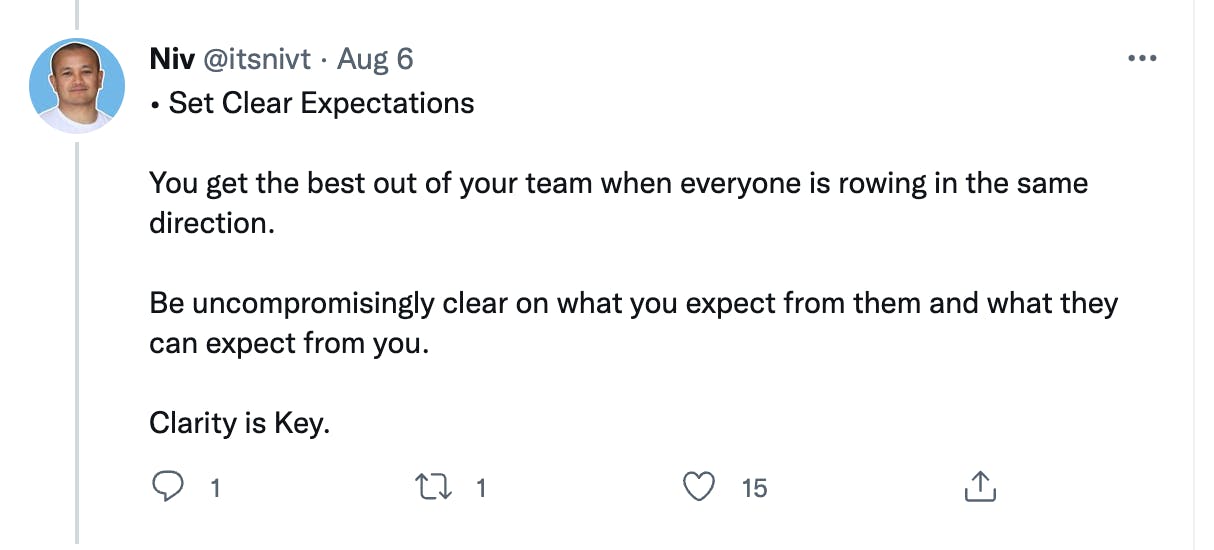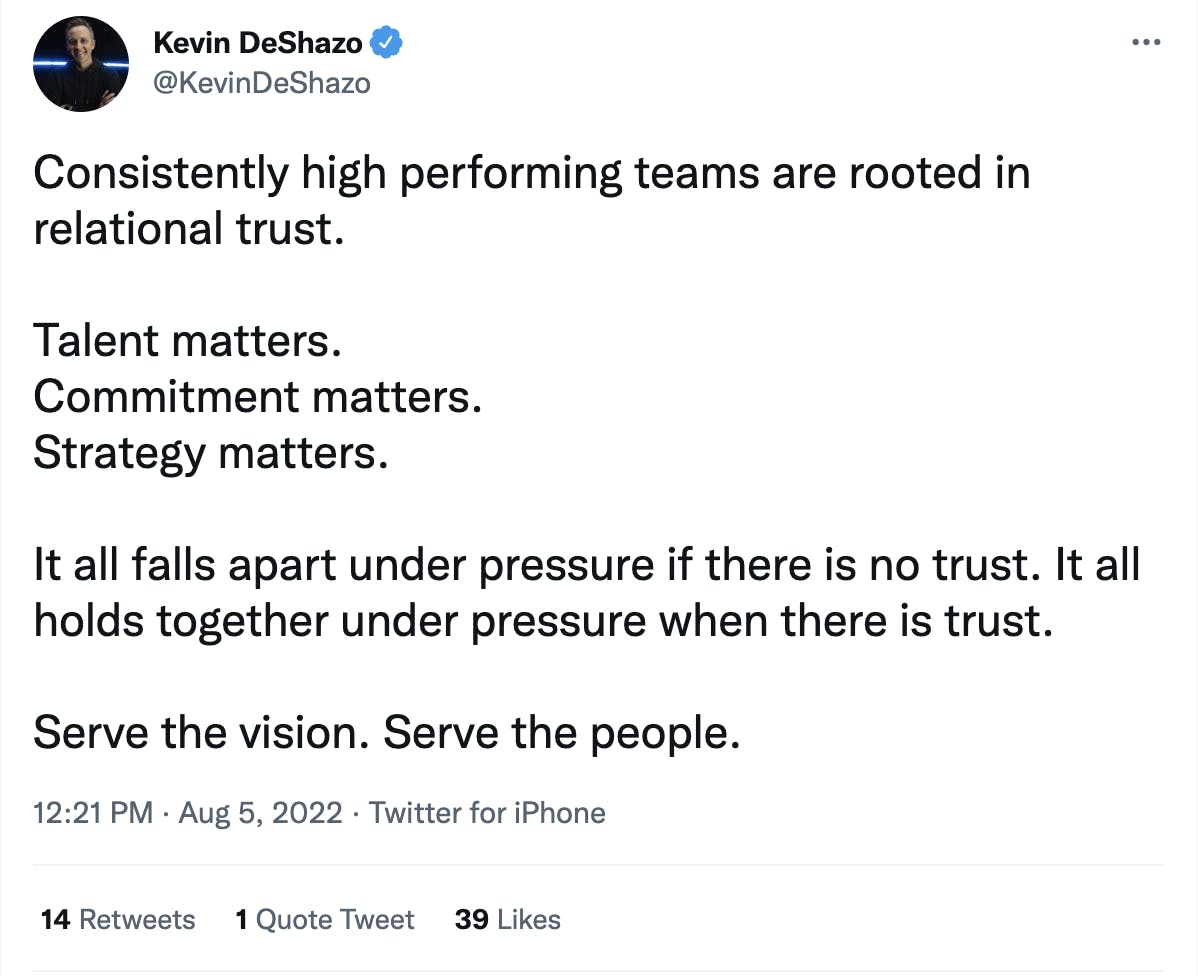How to build a high performing team at a high growth company
We all want our teams to succeed. We want projects to run on time, without issues, and to make a positive impact. While we can’t guarantee there will be no obstacles in the way, we can set ourselves up for a better chance of success by building high performing teams. Let’s take a closer look at high performing teams, what they are, and how to support your own team to work at their best in a fast-paced, high growth company.
What is a high performing team?
A high performing team, also known as a high performance team, is one that works effectively together to get things done. High performing teams are made from experts in their field, with strong technical and problem solving skills, that work together to achieve a target or goal.
What sets a high performing team apart from any other is their commitment, drive, and willingness to collaborate. Team members that perform highly are excellent communicators, gifted at negotiation, and show a great respect for theirs and others’ time and needs. They understand what needs to be done, how to do it, and how to communicate that with those around them.
“High performing teams are typically very results-oriented and are always looking for ways to improve. They are constantly challenging themselves and pushing boundaries. This type of culture can be very motivating and inspiring for everyone involved.” — Brandon Schroth, Founder, Reporter Outreach
What the experts say about high performing teams
While there’s no one set definition of what exactly makes up a high performing team, experts have studied the concept thoroughly. Pat MacMillan, CEO and Founding Partner of Triaxia Partners, published the High Performance Team® model in 2001 that set out the key characteristics as:
- Common purpose
- Clear roles
- Accepted leadership
- Effective processes
- Solid relationships
- Excellent communication
These themes all remain valid in today’s world of work. There’s no doubt that effective communication and strong relationships with our team members helps us work better together.
Offering us more insight into strong teams, Google’s People Operations team published research in 2015 that shared what a successful team at Google looks like. Structure was a common theme in the list, but it also introduced characteristics like psychological safety, dependability, meaning of work, and impact of work. Highlighting the need for support and trust in our team members feels like a very relevant theme for the way our teams operate today.
10 habits and characteristics of high performing teams in high growth environments
It’s no surprise that some of these themes run through almost every highly successful team. Collaboration, communication, and reliability are a must-have if you want to make an impact in fast-moving high growth companies.
Let’s explore some of the most common characteristics among high performing teams, and how they translate to today’s high growth workplaces.
1. Clear goals
Teams that consistently perform well are the ones with clear goals. Without a defined target or goal, it’s impossible to make progress in the right direction. Leaders of high performing teams know this, and prioritize setting and highlighting a common goal.
Your team goal might be to deliver a project on time and on budget, by a certain date. It might be to develop a better way to solve a specific problem. Whatever it is, invest the time in finding out what your main shared goal is, and how to communicate that clearly to your team members.

2. Distinct roles and responsibilities
High performing team members know exactly what their role is and how it fits into the success of the project. There’s a clear list of responsibilities and tasks that they take ownership of and deliver to the best of their ability.
Any great team has a strong team leader with decision making abilities, but there are also other defined roles within the group. Give each team member a clear purpose, and empower them with responsibilities and actions that drive the project forward. Use our DACI Decision-Making Framework template to determine everyone's roles and clearly communicate their responsibilities to the team.
3. Meaningful work
We often do our best work when we feel like we’re making a difference or the end result fits with our overall beliefs or values. Give your team members meaningful work to do, with a clear purpose, and they’re more likely to succeed.
Having a shared vision and purpose between your personal goals and company goals helps with engagement, motivation, and overall satisfaction. Keep this in mind whenever you assemble a new team for a project, and make sure to look for team members that feel aligned with your goals.
“A team that is aligned with the vision is a team that knows where their contributions go and the impact that they can make. Setting clear directions and success measures are, therefore, key to developing this very important characteristic.” — Sheen Escano, SEO Team Manager, SafetyCulture
4. Curiosity
Your strongest team members know that they don’t know everything. They want to discover more, become an expert in their line of work, and deliver the best possible outcomes for their projects. Seek out people for your team that are curious, lifelong learners.
Encourage and support your team members’ desire to learn and grow. Host coaching sessions for your high performing team members, allow them to develop their skill sets, and use Pyn to help you support their career development, with timely nudges and career conversation guides.
5. Reliability
Every team needs to know they can trust their coworkers to deliver. Dependability on our team members is a must-have, especially in a high performing team at a high growth company where you’re likely to encounter roadblocks.
Look for team members that you can depend on, and encourage this as a core value. Promote a culture of transparency and trust, and encourage your team members to communicate with each other when there’s likely to be a problem. Both of these elements of your team culture will help you improve reliability, so your team can always work at their highest level.

6. Effective communication
The very best teams are those where open communication is the default. High performing teams value clear communication, as it helps them achieve their goals without delay or confusion.
Develop a team culture that supports better communication, and give your team the tools they need to do this. Use asynchronous communication for non-urgent questions, so team members can respond in their own time. For timely matters, host a quick call or meeting so you can tackle the challenge and keep moving towards your end goal.
7. Diversity
For your team to truly perform at their best, there needs to be a wide range of skills, talents, knowledge, and backgrounds. Embrace diversity across every aspect of your team, from different cultures and experiences, to diverse and complementary skills.
Make diversity a priority right from the start, and review your onboarding process to make sure it’s inclusive. For more ideas on how to shift towards a better culture for all, see our guide on inclusive workplace communications.
8. Psychological safety
Working at your best means experimenting and making mistakes, which is why psychological safety is such a key habit to promote within any team at a high growth company. Your team members need to feel free to challenge, try, fail, and do it all over again without feeling bad about it.
“A good team will have open channels of communication where everyone feels safe taking risks, speaking up, and being vulnerable with one another. This way, you can maintain a cohesive team that works together efficiently towards common goals. This entails having trust and mutual respect amongst members, further fostering a positive and productive working environment.” — Craig Anderson, Founder, Express Dentist
The team at Google identified psychological safety — the ability to take risks and be vulnerable in front of others — as the most important of their team dynamics. Build a team culture where it’s okay to ask someone to repeat a question, clarify a goal, or help with a problem. Create a working environment where themes like vulnerability and failing aren’t negatives, they’re just another part of the high growth process.
9. Teamwork
Any great team knows the value of teamwork, but it’s a habit that’s a must-have for those in high growth companies. With conflicting demands, tons of pressure, and innovation happening all the time, it’s more important than ever to create a sense of belonging within the team.
Encourage your team members to collaborate to solve problems, and trust each other to do what they’ve said they will. Create moments where everyone can relax and talk, and get to know each other better. Highlight the need to work together towards your shared goal, instead of dwelling on differences or trying to make things happen alone.
“I've found that the key to our success has been our ability to work together cohesively as a team. By closely supporting each other, we've created a strong sales pipeline and driven impressive growth for Instrumentl. We're constantly sharing ideas and best practices with each other and always looking for ways to improve our collective performance.” — Will Yang, Head of Growth, Instrumentl
10. Celebrating success
Your high performing team is bound to work at their best, and produce the kind of results that deserve to be celebrated. Make appreciation and celebration a core theme within your team to not only share the excitement, but to encourage continued high quality work.
Research led by award-winning psychologist Ron Friedman PhD found that members of high performing teams received a staggering 72% more frequent appreciation at work. Not only that, but they also offered 44% more appreciation towards their coworkers. Showing appreciation for each other is an intrinsic part of high performing teams.
With open communication such a key part of successful teams in high performing companies, ask your team members how they’d like to be celebrated. Shout out great work through your team chat app, in meetings, and in private thank yous — whichever suits your team members best.
Build your way to a high performing team
Building high performing teams doesn’t happen instantly. You need the right people, with the right set of core values, before you can put together a winning team.
Once you’ve found your people, find ways to develop the highly successful habits we’ve talked about. Encourage communication, collaboration, and trust in each other. Celebrate the wins, and create space for vulnerability and failure.
High performing team leaders see the value in supporting their teams through every moment, so they can work at their highest level. If you’re ready to challenge your team to achieve their full potential, invest in Pyn’s personalized employee communications.
Our innovative platform helps you send the right messages to the right team members, at the right time. Nudge managers so they can lead with purpose, support team members through life’s moments, and build a culture around open communication. Explore a better way to communicate — try Pyn today.
